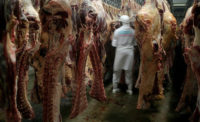In 2016, the Food Safety and Inspection Service (FSIS) began assessing whether establishments are meeting the Salmonella performance standards for raw poultry carcasses, chicken parts and not-ready-to-eat comminuted poultry products. On June 22, 2018, FSIS issued Notice 32-18, Actions To Take in Raw Poultry Establishments Exceeding Salmonella Performance Standards, instructing FSIS personnel on what actions to take at establishments that are exceeding Salmonella performance standards and are thus in Category 3.
FSIS response to Category 3 designation
Through the Public Health Information System (PHIS), the agency’s staff are notified when the establishment has exceeded a Salmonella performance standard. This sets in motion several agency actions, including, in most instances, a Public Health Risk Evaluation (PHRE) and, potentially, a Food Safety Assessment (FSA). FSIS will commence its response, which will include follow-up sampling, within four weeks of receiving notice of the establishment’s Category 3 designation. This will allow establishments the opportunity to initiate reassessment and corrective actions if they have not already.
Notice 32-18 states an establishment that has exceeded its Salmonella performance standard may not have adequately addressed Salmonella as a food safety hazard in its HACCP system. Establishments that had previously identified Salmonella as a hazard that was reasonably likely to occur (RLTO) are required to take corrective actions. If an establishment did not consider Salmonella a hazard that was RLTO, it must take and document corrective action(s) and reassess its HACCP system to determine whether it should be modified.
Notice 32-18 has divided the responsibility for responding to a Category 3 designation among several types of FSIS personnel. Below, we have summarized the various assigned tasks.
Inspection Program Personnel (IPP)
IPP are responsible for direct communication with the establishment. IPP are to notify establishments of a failure of the Salmonella performance standards at weekly meetings and to use the weekly meetings to share concerns regarding the establishment’s efforts to control Salmonella, based on collected data from both the agency and the establishment, verification of implementation and effectiveness of corrective measures and any applicable regulatory waiver data. These weekly meetings will be documented. IPP are also to verify the establishment is undertaking appropriate corrective actions and meeting reassessment requirements.
Enforcement, Investigations, and Analysis Officers (EIAO)
The EIAOs primary responsibility is to conduct a PHRE focusing on the establishment’s corrective actions and HACCP plan reassessment with a view toward ensuring the plant has an effective system for controlling Salmonella in raw poultry products. The EIAO is also responsible for verifying whether the agency’s microbial sampling findings match any PulseNet cluster codes. Based on the PHRE and historical information, the EIAO will also determine whether an FSA is necessary. Factors that will be considered in recommending an FSA will include, but not be limited to: whether the establishment identified a root cause for failing the Salmonella performance standards and implemented corrective actions that are supportable; whether the establishment has reassessed its HACCP plan if it determined Salmonella is a hazard not RLTO and has support for its decision-making; how many products and how long the establishment has been in Category 3; whether the establishment evaluates supplier controls for Salmonella, routinely monitors Salmonella levels of incoming product, and determines whether interventions are sufficient to reduce Salmonella levels to meet the standard; and whether the establishment has a microbial sampling program to measure the adequacy of its controls for Salmonella. Importantly, the failure of the Salmonella performance standard should not be a reason to conduct an FSA alone.
District Office (DO)
The DO is responsible for scheduling the PHRE within 30 days after it receives notice of the Category 3 designation. The DO may schedule a PHRE without receiving notice from PHIS if it is aware that the establishment is exceeding performance standards or if there are other reasons to support a PHRE. Also, the DO may elect to not schedule a PHRE if the establishment cycles in and out of Category 3 and it has recently undergone a PHRE.
Enforcement
Failure of an establishment to meet Salmonella performance standards is not sufficient grounds for a DO to issue a Notice of Intended Enforcement (NOIE) or suspend inspection, but the Notice indicates that such failure may be an indication of an inadequate HACCP or Sanitation Standard Operating Procedure (SSOP). If appropriate corrective actions are not taken within 90 days, the DO will determine whether additional enforcement is required. NP




Report Abusive Comment